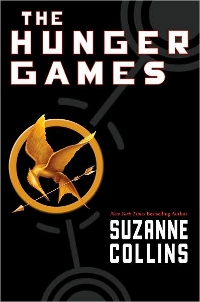
An Ode to The Hunger Games
Written by: Beth Woodward, CC2K Books Editor
 I’ve made no secret of my love for The Hunger Games series (like here, and here, and here). I remember reading the first book back in 2008, just months after it was released. At that time, it was gaining popularity, partially because of some well-timed praise from Twilight author Stephenie Meyer and horror master Stephen King. (I challenge you to find two authors who represent more drastically different aesthetics and ideologies than that!) But it was still kind of a low-key thing. No one—besides avid YA readers—had heard of it.
I’ve made no secret of my love for The Hunger Games series (like here, and here, and here). I remember reading the first book back in 2008, just months after it was released. At that time, it was gaining popularity, partially because of some well-timed praise from Twilight author Stephenie Meyer and horror master Stephen King. (I challenge you to find two authors who represent more drastically different aesthetics and ideologies than that!) But it was still kind of a low-key thing. No one—besides avid YA readers—had heard of it.
Then, as each subsequent book was released, I saw the frenzy grow bigger and bigger. Now, with the release of the movie just days away, everyone seems to have developed Hunger Games fever.
And that is the coolest thing I’ve seen happening in the book world in a long time.
The Hunger Games books are not fluffy. They’re about oppression and rebellion and war. This is a series that features children killing one another. It’s a series that portrays both the Capital and the rebellion as corrupt. It’s a series that questions whether humans can ever govern themselves without getting into futile, ultimately meaningless wars. It’s a series that provides a small, ambiguous ray of hope only after everything else has been irrevocably broken. Katniss is one of the strongest heroines I’ve ever encountered—in YA or otherwise—yet part of her dies because of the things she’s done and experienced.
These are not easy books to read. There are no easy answers, and there are no “happily ever after” endings. Yet both teen and adult readers are embracing them.
I’m glad. Books should challenge your paradigms and make you think sometimes. Mockingjay was one of the hardest books I’ve ever read, and I suspect it was partially because it hit so close to home. My younger brother is in the Army and deployed to Afghanistan right now. He’s only two years my junior, but I still think of him as the blond-haired kid with a bowl cut and squeaky voice. That said, at 26, my brother is hardly a child anymore. My mind keeps wandering back to the 18 and 19 year olds who join the military right out of high school. Collins’ youthful protagonists are nearly the same age. I don’t think that’s a coincidence.
That’s not to say books can’t, or shouldn’t, be fun or fluffy, a la the last big YA phenomenon, Twilight. I want to set one thing straight, for the record: I liked the Twilight series. I enjoyed reading the first three books so much that I preordered Breaking Dawn so that it would be waiting on my doorstep on release day. I was disappointed in Breaking Dawn because Meyer used some cheap plot devices (Jacob imprinting on Renesmee, the anticlimactic battle scene near the end) to ensure happy endings for everyone. There were also some undertones in the story that I didn’t care for, such as Bella’s constant self-deprecation in contrast to her hero worship of Edward, and her casual acceptance of Edward’s controlling, stalkerish behavior. As an adult, I can separate these messages out, but I worry that teenage readers might internalize these values more than I’d like. But that came later. When I read the books, I enjoyed them for what they were: an escapist fantasy about a teenage girl who falls in love with a vampire.
There’s nothing wrong with escapism. I read escapist books all the time. They’re important, because they allow you to push the real world away and submerge yourself in fantasy. Let’s just face it: in the high-stress, high-demand world we live in, sometimes we need escapism.
But escapist books are easy. Books like The Hunger Games trilogy are not, because they make us face darker things, make us ask the difficult questions. There was no easy way out for Katniss, nor will there be for readers of the series.
I’m just glad we have a culture of readers that makes room for both.
